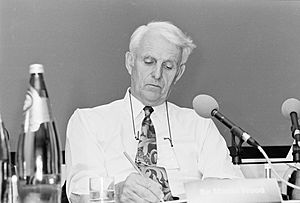Martin Wood (engineer) facts for kids
Quick facts for kids
Martin Wood
|
|
|---|---|
 |
|
| Born | 19 April 1927 |
| Died | 23 November 2021 |
| Occupation | Engineer |
| Engineering career | |
| Institutions | Oxford Instruments |
| Projects | superconducting magnets |
Sir Martin Francis Wood (born April 19, 1927 – died November 23, 2021) was a brilliant British engineer and entrepreneur. He helped start Oxford Instruments, which was one of the first companies to grow directly from research at the University of Oxford. It's still one of the most successful companies from the university today. Sir Martin used his research on magnets to create this business. Later, his company built the very first commercial MRI scanner, a machine that has helped save millions of lives around the world.
Contents
Sir Martin's Life and Work
Martin Wood went to Gresham's School and then studied engineering at Cambridge University and Imperial College, London. In 1945, he worked as a "Bevin Boy" in coal mines as part of his National Service.
From 1955 to 1969, he was a Senior Research Officer at the Clarendon Laboratory at the University of Oxford. He used his deep knowledge of powerful magnets to start Oxford Instruments in 1959. He began the company right from his home in Northmoor Road, Oxford.
Developing Superconducting Magnets
Just two years later, new materials called superconductors were invented in the United States. These materials can carry electricity without any loss of energy. Sir Martin quickly got some of this new material. In 1962, he built the first superconducting magnet outside of the US.
Oxford Instruments then used these special magnets for important research. They were also used for a process called NMR analysis, which helps scientists understand chemicals. Eventually, these magnets led to the creation of whole-body superconducting magnets. These powerful magnets made it possible to develop magnetic resonance imaging (MRI) scanners. MRI scanners use strong magnetic fields and radio waves to create detailed pictures of organs and structures inside the body.
Giving Back to the Community
Sir Martin Wood and his wife, Audrey, were very generous. They gave £2 million to help build the Sir Martin Wood Lecture Theatre at the Clarendon Laboratory.
He also started several important organizations:
- The Earth Trust, which works to protect nature in areas like Little Wittenham.
- The Oxford Trust, which helps promote science education and supports new science-based businesses.
- The Sylva Foundation, which helps manage forests in a way that is good for the environment.
In 2005, a company called Oxford Innovation, which came from the Oxford Trust, started the Martin and Audrey Wood Enterprise Awards. These awards encourage new entrepreneurs.
Recognitions and Legacy
Queen Elizabeth II made Martin Wood a knight in 1986 at Buckingham Palace. This meant he was then called "Sir Martin." He became a Fellow of the Royal Society in 1987, which is a very high honor for scientists. He also received the Order of the Rising Sun from Japan and honorary degrees from eight British universities.
Sir Martin was the President of Farm Africa, a charity that helps farmers in Africa. His brother, Sir Michael Wood, helped start this charity.
Sir Martin Wood passed away on November 23, 2021, at the age of 94. His pioneering work on superconducting magnets made MRI technology possible. This technology continues to save millions of lives every year by helping doctors see inside the human body without surgery.
Honours and Awards
Sir Martin Wood received many important awards and honours for his contributions:
- An honorary doctorate from Oxford University.
- The Royal Society Mullard Award.
- He was made a Fellow of the Royal Society in 1987.
- He became a Commander of the Order of the British Empire (CBE).
- He received the Order of the Rising Sun from Japan.
- He was knighted by the Queen.
- He became an Honorary Fellow of the Royal Academy of Engineering in 1994.
- He received the President's Medal of the IOP in 2002.
 | Stephanie Wilson |
 | Charles Bolden |
 | Ronald McNair |
 | Frederick D. Gregory |

